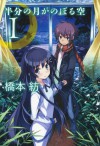23
Following
The Emotional Range of a Teaspoon
Bookworms thrive here, in the lair of an OCD... ahem, avid artist and snarky critic who loves Hermione, is in an abusive relationship with anime, and is obsessed with the incorrect use of "good."
Currently reading
半分の月がのぼる空 1: 1 (Japanese Edition)
Me, Just Different
The Rithmatist
Tamashii O Tsunagu Mono
No.6, Volume 1
Hawksong
H.I.V.E.: Higher Institute of Villainous Education
Fearless
 As the end drew near, I realized that I was reading this book so fast because it was a library book. That I cared more about the fee than the book itself. Oh, Funke. You like building worlds, right? They’re nice, really, but you can’t make a whole pie with just a vivid story.
As the end drew near, I realized that I was reading this book so fast because it was a library book. That I cared more about the fee than the book itself. Oh, Funke. You like building worlds, right? They’re nice, really, but you can’t make a whole pie with just a vivid story.Forget it.
It’s funny. I really, really liked Funke’s books at one point, even crowning her a favorite author of mine. I loved her style of storytelling and what she weaved with carefully chosen words. Actually… Like some others, it was Inkheart and only Inkheart. As I read more of her books, I realized that maybe I didn’t like them as much as I thought, and began to doubt my love for her. I have to commend her for what she is skilled at, because those things she does very well, and I’ll remember her for the inspiration her writing spoon-fed into my mouth, but really. Really. This book was so disappointing, and I didn’t even have expectations.
Returning to the pie analogy, this pie was burnt and bland, cooked far too long with not enough substance. It screamed for sugar and eggs and some spices. Something to make it special. To make it more.
There was no characterization—at all. I realized that there never had been. They completely lack enigma and chemistry. The characters were the bare minimum of everything else you’d see in a typical story with a finishing touch of the most common human emotions. Emotions are described but not felt because they come straight from Funke instead of being breathlessly spoken through a character that seems real enough to touch. The plot, even, was rigidly built, completely predictable.
As always, it was the world that kept this story afloat. Just barely. Funke’s storytelling has strength and so does her world-building, but her stories really mimic a childhood fairy tale in the worst way.
They’re simple.
(Also posted on my blog.)










